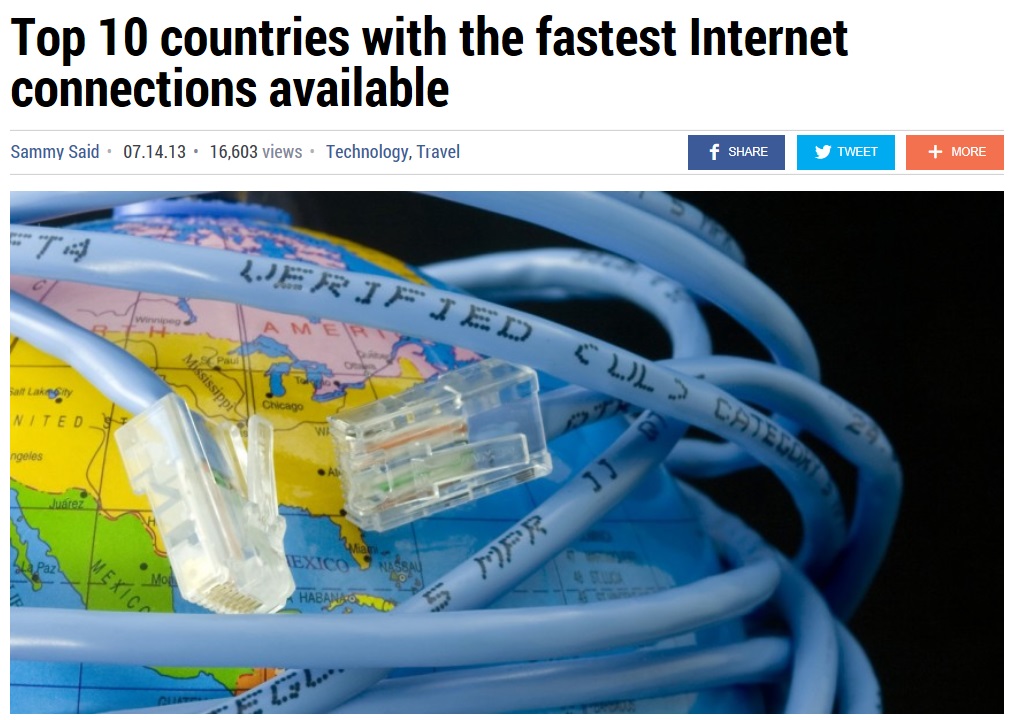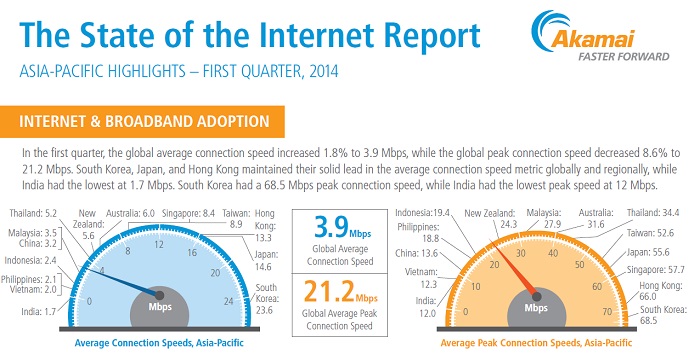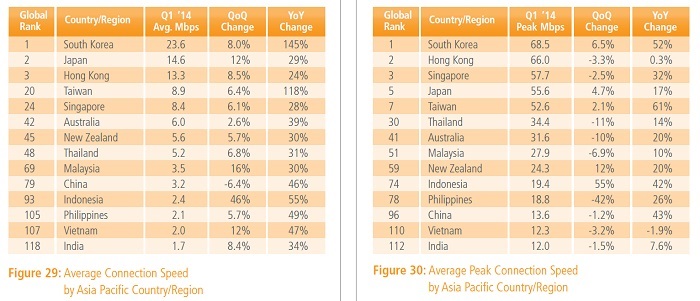-
 Korea.net's 24-hour YouTube channel
Korea.net's 24-hour YouTube channel- NEWS FOCUS
- ABOUT KOREA
- EVENTS
- RESOURCES
- GOVERNMENT
- ABOUT US
Korea has the fastest Internet speed in the world.
According to the latest quarterly report “State of the Internet” on July 1 from Akamai Technologies, a cloud services provider in the U.S., Korea topped all other countries in the last quarter in terms of average Internet connection speed, with a speed of 23.6 megabits per second, or Mbps, and a year-on-year increase of 145%.

The new report suggests that average Internet speeds have been steadily increasing internationally, and among those in the top ten, Korea has seen the biggest jump in the first quarter of 2014.
Rounding out the top ten are Japan, Hong Kong, Switzerland, Netherlands, Latvia, Sweden, the Czech Republic, Finland and Ireland.
On top of that, the nation has recorded an “average peak connection speed” of 68.5 Mbps, taking over top spot from last year’s winner Hong Kong.
The nation also comes in at No. 1 in terms of high-speed Internet and high broadband adoption rates, up 146% and 25% year-on-year, respectively.


Since the report was made public, reactions have flooded in from all around the world.
For example, a British Internet user reacted with, “I pay $30 every month for this snail-slow 4 Mbps connection. Having at least 20 Mbps speed would feel like being in heaven, I believe.”
Another user said, “Korea [the people] does not ‘surf’ the Internet, as things come up with just one quick click. And it will get faster, no doubt.”
A Canadian commented that, “We [Canadians] usually don’t complain about the status on the Internet, but these results make some difference to the way we think.”
Meanwhile, an American user said, “We have thought only about movies, games and music when we are on cyberspace. But the Korean government takes into consideration economic effects. They must think that increasing the speed of data transmission is just like establishing the national infrastructure such as highways and railways, which, they think, plays a pivotal role in the national development. I think it is such a wise and brilliant idea.”
There was a flood of reactions from China, too. “I feel envious. I’m eager to emigrate to Korea,” “Living in a small country is good, as you can get the fastest Internet lines at such a low cost. We [China] still have a long way to go until we keep up with the speed,” and “With that speed, I could download a movie in a twinkle,” to name just a few.
The first access Korea had to the Internet world dates back to 1982. Later, in 1994, PC communication services by the names of Hitel and Chollian came out in Korea for the first time, and were hugely popular. Since then, the government has made an all-out effort to set up the Internet infrastructure by putting in place a variety of public internet services, including e-commerce, electronic civil services and electronic news & broadcasting.
As a result, life has become a lot more convenient as the government has computerized all administrative procedures and transformed itself into an “e-government.” Thanks to these efforts, it ranked first among U.N. member countries from 2010 until 2012 on the e-Government Development Index and e-Government Participation Index of the United Nations e-Government Survey.
The efficiency and rapidity of information use across the Internet has helped the nation open a new chapter in information and communications technology (ICT).
By Sohn JiAe
Korea.net Staff Writer
jiae5853@korea.kr
According to the latest quarterly report “State of the Internet” on July 1 from Akamai Technologies, a cloud services provider in the U.S., Korea topped all other countries in the last quarter in terms of average Internet connection speed, with a speed of 23.6 megabits per second, or Mbps, and a year-on-year increase of 145%.

The new report suggests that average Internet speeds have been steadily increasing internationally, and among those in the top ten, Korea has seen the biggest jump in the first quarter of 2014.
Rounding out the top ten are Japan, Hong Kong, Switzerland, Netherlands, Latvia, Sweden, the Czech Republic, Finland and Ireland.
On top of that, the nation has recorded an “average peak connection speed” of 68.5 Mbps, taking over top spot from last year’s winner Hong Kong.
The nation also comes in at No. 1 in terms of high-speed Internet and high broadband adoption rates, up 146% and 25% year-on-year, respectively.


The quarterly report from the U.S. cloud services provider Akamai Technologies places Korea at top spot in the world in average Internet connection speed and average peak connection speed. (photo courtesy of Akamai Technologies)
Since the report was made public, reactions have flooded in from all around the world.
For example, a British Internet user reacted with, “I pay $30 every month for this snail-slow 4 Mbps connection. Having at least 20 Mbps speed would feel like being in heaven, I believe.”
Another user said, “Korea [the people] does not ‘surf’ the Internet, as things come up with just one quick click. And it will get faster, no doubt.”
A Canadian commented that, “We [Canadians] usually don’t complain about the status on the Internet, but these results make some difference to the way we think.”
Meanwhile, an American user said, “We have thought only about movies, games and music when we are on cyberspace. But the Korean government takes into consideration economic effects. They must think that increasing the speed of data transmission is just like establishing the national infrastructure such as highways and railways, which, they think, plays a pivotal role in the national development. I think it is such a wise and brilliant idea.”
There was a flood of reactions from China, too. “I feel envious. I’m eager to emigrate to Korea,” “Living in a small country is good, as you can get the fastest Internet lines at such a low cost. We [China] still have a long way to go until we keep up with the speed,” and “With that speed, I could download a movie in a twinkle,” to name just a few.
The first access Korea had to the Internet world dates back to 1982. Later, in 1994, PC communication services by the names of Hitel and Chollian came out in Korea for the first time, and were hugely popular. Since then, the government has made an all-out effort to set up the Internet infrastructure by putting in place a variety of public internet services, including e-commerce, electronic civil services and electronic news & broadcasting.
As a result, life has become a lot more convenient as the government has computerized all administrative procedures and transformed itself into an “e-government.” Thanks to these efforts, it ranked first among U.N. member countries from 2010 until 2012 on the e-Government Development Index and e-Government Participation Index of the United Nations e-Government Survey.
The efficiency and rapidity of information use across the Internet has helped the nation open a new chapter in information and communications technology (ICT).
By Sohn JiAe
Korea.net Staff Writer
jiae5853@korea.kr
Most popular
- China warmly welcomes first Korea-born giant panda Fu Bao
- First hearing-impaired K-pop act hopes for 'barrier-free world'
- Novelist Hwang's 'Mater 2-10' shortlisted for Int'l Booker Prize
- Expats could account for 7% of population in 20 years: report
- Nat'l Fire Agency picks 137 elite staff for deployment abroad













